|
|
|
Sort Order |
|
|
|
Items / Page
|
|
|
|
|
|
|
| Srl | Item |
| 1 |
ID:
171869
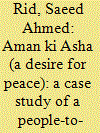

|
|
|
|
|
| Summary/Abstract |
Aman ki Asha is a joint initiative of the two leading media groups of India and Pakistan, The Times of India and the Jang Group of publications, which uses media cooperation for promoting people-to-people contacts and building peace. This is a unique initiative because in the history of peacebuilding, never before the mainstream media houses of conflicting communities are involved in such a peace initiative. Generally local media is seen inflaming the fires of conflict by following the nationalistic lines and portraying one sided picture of the conflict. After its launch in 2010, within few years Aman ki Asha emerged as one of the most successful peace initiatives between India and Pakistan but then suddenly in 2014 it became dormant when Jang group came under attack from the Pakistani military establishment and bilateral India-Pakistan relations worsened under Modi government in India. In this paper an attempt is made to provide a holistic story of Aman ki Asha covering its rise and decline. Moreover, the role played by Aman ki Asha in building peace between India and Pakistan at the top level, the middle range level and the grassroots levels is studied, and its current status is determined.
|
|
|
|
|
|
|
|
|
|
|
|
|
|
|
|
| 2 |
ID:
176505
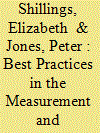

|
|
|
|
|
| Summary/Abstract |
Measuring the impact of Track Two dialogues has proven a difficult challenge for the field over many years. Each dialogue is different, which makes a standardized test difficult to achieve. Moreover, different actors wish to measure different things: “value” for money; impact on the conflict; how certain facilitation techniques work; and others. In this article, we present a model that can be used to measure the impact of a dialogue over time, while also encouraging reflective practice in the field. This “Reflective Practice Model” can be used to provide a snapshot of a particular moment – or as a vehicle for the accumulation of a series of such moments – thereby providing a means to observe and measure changes as the dialogue goes on.
|
|
|
|
|
|
|
|
|
|
|
|
|
|
|
|
| 3 |
ID:
176501
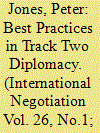

|
|
|
|
|
| Summary/Abstract |
While “Track Two Diplomacy” has been intensively researched since its founding some 60 years ago, much remains to be done to explore important gaps in our understanding of these dialogues. Track Two presents unusual research problems, given its operational and often confidential nature. The contributions to this special issue of International Negotiation tackle some of the key issues confronting the field in an effort to present where we stand in terms of best practices and where further thought and research is required.
|
|
|
|
|
|
|
|
|
|
|
|
|
|
|
|
| 4 |
ID:
123172
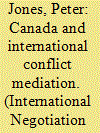

|
|
|
|
|
| Publication |
2013.
|
| Summary/Abstract |
Abstract This article explores the attitudes of Canadian officials towards international conflict mediation and towards the potential for greater official Canadian involvement in the field. The study is based on extensive interviews with Canadian officials who have been involved in mediation at various points over a 20-year period. It finds that Canada, and particularly the Department of Foreign Affairs and International Trade (DFAIT), has taken a largely ad hoc approach to its involvement in the field. Prior to the initiation of this study, there had been no attempt to develop an institutional capacity in this field within DFAIT or to keep track of the personnel involved in such experiences, much less to develop a trained cadre of such individuals. This stands in contrast to the efforts of countries that have prioritized mediation as a foreign policy activity, such as some Scandinavian countries and Switzerland. Many of those interviewed pointed to these countries as potential models for Canada in this field, but it became apparent in discussions that most of those interviewees were not necessarily well-informed as to what these countries have done; there was just a general sense that these countries do it well and that Canada could learn from them. Moreover, none of the interviewees demonstrated significant familiarity with the vast literature on mediation. Those interviewed made recommendations as to how Canada might develop its official mediation capacities so as to play a more active and focused role in this field.
|
|
|
|
|
|
|
|
|
|
|
|
|
|
|
|
| 5 |
ID:
142219
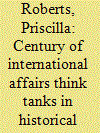

|
|
|
|
|
| Summary/Abstract |
This essay surveys the operations of foreign policy think tanks, and how they have functioned to create transnational knowledge networks, since their emergence in the early twentieth century, around the First World War. It discusses how patterns of linkages among foreign policy think tanks changed and evolved over time, and were linked to broader Anglo-American, imperial, and internationalist networks and relationships, and to the changing international political climate and configuration. It suggests some ways in which think tanks contributed to Cold War interchanges between different states, especially to Soviet bloc–Western relations and Asian–Western relations. It concludes by discussing the recent proliferation and frequent globalization of foreign policy think tanks, and suggests how such trends may develop in future.
|
|
|
|
|
|
|
|
|
|
|
|
|
|
|
|
| 6 |
ID:
178178
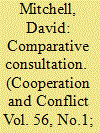

|
|
|
|
|
| Summary/Abstract |
Exchanges of expertise and experience between personnel involved in different peace processes are now a common feature of peacemaking worldwide. However, the goals, methods and impact of such interactions have been subject to little research. This article is the first scholarly analysis of what is here called ‘comparative consultation’. The article begins by conceptualising this work as a unique form of Track Two unofficial diplomacy, sharing the practical format and theoretical grounding of other Track Two approaches but differing in content. The empirical section is based on semi-structured interviews with 16 practitioners – primarily conflict resolution non-governmental organisation personnel and academics – who have facilitated dialogues on peace process topics (such as negotiation, transitional justice, grassroots peacebuilding) between peace process actors at various levels and from many contexts. It also draws on the author’s participation in a series of comparative consultation events. The findings focus on aspects of the organisation, purpose and potential, and limitations and possible risks of the practice. The conclusion sets out a model of the dimensions and potential impacts of comparative consultation and argues for its recognition as a distinct peace methodology. Avenues for further research and practice are outlined.
|
|
|
|
|
|
|
|
|
|
|
|
|
|
|
|
| 7 |
ID:
072441


|
|
|
| 8 |
ID:
121844


|
|
|
|
|
| Publication |
2013.
|
| Summary/Abstract |
This study presents a systematic transcript-based analysis of the dialogue occurring in a track two workshop attended by Jewish-Israelis and Palestinians. We hypothesized that participants from conflicting groups would form a shared superordinate identity in the course of the workshop. Our findings confirmed this hypothesis. Consistent with self-categorization theory, we demonstrate that the observed Jewish-Israelis and Palestinians mutually identified with the peacecamp, a collection of people and organizations that promote dialogue and conflict resolution efforts. In line with our expectations, and in contradiction to previous findings concerning communication between groups in conflict, participants demonstrated patterns of cooperative, counter-ethnocentric interaction. Through the paradigm of social identity theory, we explain these phenomena as the result of the participants' salient superordinate peacecamp identity. The study's findings offer an innovative theoretical contribution to the common ingroup identity model, showing that the reduction of intergroup bias can actually hinder the effectiveness of conflict resolution efforts. Specifically, by forming a superordinate identity, the observed participants are left less able to represents the needs, demands, and claims of their respective national groups and, hence, less able to produce ideas acceptable to their respective publics. The study also offers a practical contribution to the field of track two diplomacy, empirically verifying Hebert Kelman's assertion that when facilitators allow participants to form a cohesive group, they risk damaging both the quality of the workshop's ideas and the participants' ability to influence their leaderships (Rouhana and Kelman 1994; Kelman 1999, 2002).
|
|
|
|
|
|
|
|
|
|
|
|
|
|
|
|
| 9 |
ID:
095132
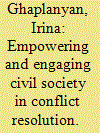

|
|
|
|
|
| Publication |
2010.
|
| Summary/Abstract |
Civil societies in Armenia, Azerbaijan and Nagorno-Karabakh have become alienated from the actual process of conflict resolution and need to be engaged in the political bargaining of the issue. This article addresses the importance of engaging civil society more deeply in this process. Only by empowering citizens through greater awareness and engaging civil society will the political elites from all sides of the conflict be forced to act more responsibly and participate in a more sincere and significant dialogue based on compromise rather than threats. To break the current deadlock, a new citizen-based initiative is needed based on a willingness to humanize the alleged enemy, consider options other than war, realize that the lives of immediate family members are at stake, learn about the benefits of compromise, and engage in reconciliation processes.
|
|
|
|
|
|
|
|
|
|
|
|
|
|
|
|
| 10 |
ID:
176504


|
|
|
|
|
| Summary/Abstract |
This article examines best practices in local ownership of Track Two diplomacy. Taking as a starting point the idea that best practices change over time as conflicts and social responses to them change, the article seeks out recent innovations and practices in Track Two diplomacy, focusing on practices of local ownership. A series of two reflective practice workshops with facilitators of Track Two processes offer insights on local ownership in current Track Two diplomacy. More in-depth examination of the Georgian-South Ossetian case illustrates an example of increasing local ownership developing over time during a ten year Track Two process. Together, the reflective practice workshops and the case study suggest team approaches to Track Two diplomacy so that insiders and outsiders work together as a team to facilitate, bringing the strengths of both insiders and outsiders to Track Two processes.
|
|
|
|
|
|
|
|
|
|
|
|
|
|
|
|
| 11 |
ID:
188903
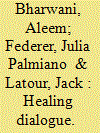

|
|
|
|
|
| Summary/Abstract |
Track Two Diplomacy, a form of facilitated informal and unofficial dialogues between conflicting parties, has become a well-established form of international conflict resolution. This paper seeks to explore whether the techniques and practices of Track Two could be applied in a new setting beyond international armed conflicts: public health. Global society continues to grapple with the devastating effects of the COVID-19 pandemic, systemic racism, and climate change, among other pressing public health issues that can not only exacerbate but also create new conflicts that negatively affect communities. Innovative and interdisciplinary approaches are needed more than ever. We synthesize literature from both Track Two and public health fields to present a conceptual framework that posits whether and how such concepts as the “problem-solving workshop,” “transfer,” “reflective practice” and others might support parties involved in divisive, intractable, visible, and invisible conflicts which currently mark the public health space.
|
|
|
|
|
|
|
|
|
|
|
|
|
|
|
|
| 12 |
ID:
188913
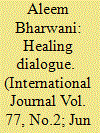

|
|
|
|
|
| Summary/Abstract |
Track Two Diplomacy, a form of facilitated informal and unofficial dialogues between conflicting parties, has become a well-established form of international conflict resolution. This paper seeks to explore whether the techniques and practices of Track Two could be applied in a new setting beyond international armed conflicts: public health. Global society continues to grapple with the devastating effects of the COVID-19 pandemic, systemic racism, and climate change, among other pressing public health issues that can not only exacerbate but also create new conflicts that negatively affect communities. Innovative and interdisciplinary approaches are needed more than ever. We synthesize literature from both Track Two and public health fields to present a conceptual framework that posits whether and how such concepts as the “problem-solving workshop,” “transfer,” “reflective practice” and others might support parties involved in divisive, intractable, visible, and invisible conflicts which currently mark the public health space.
|
|
|
|
|
|
|
|
|
|
|
|
|
|
|
|
| 13 |
ID:
176503


|
|
|
|
|
| Summary/Abstract |
This article unpacks the development of key ideas and debates which surround the ethical issues of Track Two. It defines what is meant by ‘Track Two’ and discusses how ethics might best be applied in practice to these dialogues. The ethical dimensions of four key issues are explored: accountability; the basis on which third parties feel they are entitled to intervene; the problem of dealing with actors who have committed atrocities; and ethical questions surrounding secrecy or confidentiality which is often required. The article suggests several ways forward in terms of creating a mechanism to enable practitioners to assist each other with the challenges they face. The article takes the view that a ‘hard and fast’ set of ethics may not be appropriate for the field, as each intervention is quite different, but rather that a set of ‘reflective questions’ should be developed to help practitioners confront ethical issues.
|
|
|
|
|
|
|
|
|
|
|
|
|
|
|
|
| 14 |
ID:
072443


|
|
|
| 15 |
ID:
067631


|
|
|
| 16 |
ID:
106355
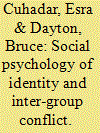

|
|
|
|
|
| Publication |
2011.
|
| Summary/Abstract |
This paper reviews the seminal theories of social psychology which have guided scholarship on inter-group conflicts and describes how these theories have been used by conflict resolution practitioners to design Track Two diplomacy initiatives among citizens in conflict zones. The authors hope that such a review will provide scholars of conflict resolution and international politics with a better understanding of how complex social theories are adapted for use in the applied world, and how gaps between theory and practice can be identified and addressed. The paper begins with an overview of three of the main theoretical contributions of social psychology to the problem of inter-group conflict: social identity theory, stereotyping and prejudice, and contact theory. We then review how these theories have been applied by conflict resolution specialists in international and ethnic conflicts as they have sought to moderate intergroup hostilities in conflict zones. The paper concludes with an analysis of the gaps between theory and practice, namely: theory of change gap, transfer strategies gap, and unit of analysis gap. Finally, based on the reviewed social psychology research, the article makes policy recommendations about how these gaps between theory and practice can be narrowed.
|
|
|
|
|
|
|
|
|
|
|
|
|
|
|
|
| 17 |
ID:
176508


|
|
|
|
|
| Summary/Abstract |
The articles in this issue present a wide range of findings. First, the field continues to grapple with definitional issues: different types of projects aimed at different outcomes and audiences. More care needs to be given by each dialogue to define rigorously what it is trying to do and why. Second, fundamental lessons have emerged over the past six decades, which must be learned and observed by those active in this field, even as they seek to push the boundaries of theory and practice. Third, while it is generally agreed that the field must become more inclusive, both in terms of people and interests, and also in terms of encouraging local ownership and more transformative projects, a one-size-fits-all approach will not work; each dialogue should be viewed as unique. Finally, the field is a dynamic and evolving one. What seems to be best practice today may not be so tomorrow.
|
|
|
|
|
|
|
|
|
|
|
|
|
|
|
|
| 18 |
ID:
077808


|
|
|
|
|
| Publication |
2007.
|
| Summary/Abstract |
Although it is often implicitly assumed by track two practitioners that track two efforts are complementary to official negotiations and are welcomed by official actors, little is known about the actual perceptions of these efforts by official parties, especially in the context of non-Western countries. Turkey, as one of these countries, was exposed to numerous track two efforts in the last decade. A survey of Turkish diplomats was conducted to explore how interventions by American- and European-based track two actors are perceived by the track one community in a developing and non-Western country. The Turkish diplomats' perceptions are organized around four categories: who are the track two actors, contributions of track two diplomacy, problems caused by track two diplomacy, and ideas concerning track two-track one cooperation. Then, the perceptions of Turkish and American diplomats are compared to assess whether their perceptions of track two diplomacy differ and, if so, in what particular ways they differ. The theoretical and practical implications of the findings are discussed and ideas for future research proposed
|
|
|
|
|
|
|
|
|
|
|
|
|
|
|
|
|
|
|
|
|